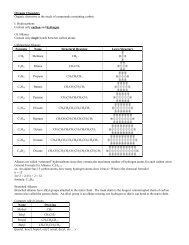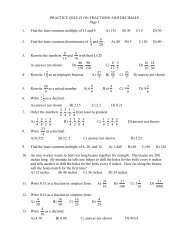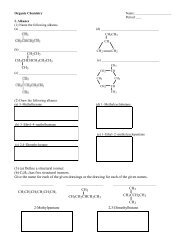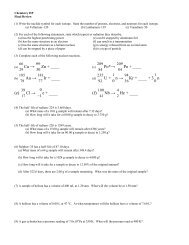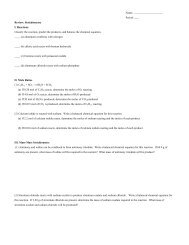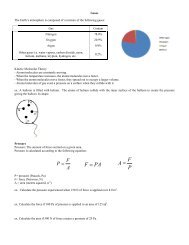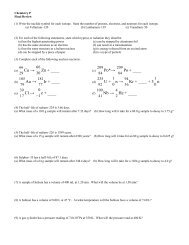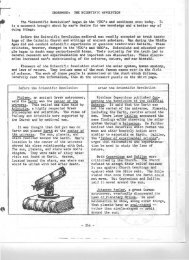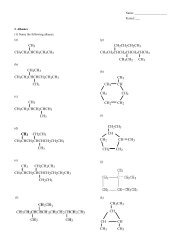ut Washington’s action had LT effects b/c it demonstrated that the nat’l gov’t would no longer tolerateviolent resistance to its laws.*The Development of Political Parties*- Even though traditional political theory saw organized opposition as illegitimate, parties were beginning toform by 1794 in the form of the Democratic-Republicans.- Jefferson and Madison, who saw themselves as the true embodiments of the Spirit of 1776 and felt thatHamilton was subverting their revolutionary ideals by favoring an overly strong central gov’t and control bywealthy merchants, led the DR’s.- In response, Hamilton and his supporters called themselves Federalists and claimed that the DR’s werean illegal faction plotting against the gov’t.- Washington first tried to stay out it all, but ended up staying for another term in 1792 in the hope ofpromoting unity. But it got more <strong>com</strong>plicated when issues in foreign affairs further divided the two camps.*The French Revolution and Foreign Affairs*- In 1789 most <strong>Am</strong>ericans supported the FR, but as it got bloodier and bloodier some began to reconsider.Then, in 1793, France declared war on Britain, Spain, and Holland, and the US had a bit of a problem: On one side, there was the 1778 Treaty of Alliance with France and the whole shared idealsof republicanism thing. On the other the US had previous bonds to Britain and also depended on British imports [andthe tariffs from them] for $.- Citizen Genêt – in April 1793 this guy began traveling around <strong>Am</strong>erica recruiting <strong>Am</strong>ericans forexpeditions against the British and Spanish. The US responded w/a a declaration of neutrality, but eventhough Genêt’s side got kicked out of power and he just stayed for asylum in the end, arguments continued.- DR societies, which were organized between 1793 and 1800 and were seen by some as dangerous [ex.Hamilton and even Washington], supported France strongly.*Jay’s Treaty*- Meanwhile, Washington sent John Jay to London to negotiate w/the British about several pressing issues:(1) British seizures of <strong>Am</strong>erican merchant ships, (2) the forts *still* in the <strong>Am</strong>erican Northwest, (3) a<strong>com</strong>mercial treaty and (4) <strong>com</strong>pensation for slaves who left w/their army after the war.- It was tough, and in Jay’s Treaty Britain only ended up agreeing to get rid of the forts and some traderestrictions. In return England could have tariffs on <strong>Am</strong>erican goods, English exports got most favored statusin the US and the US agreed to <strong>com</strong>pensate for pre-revolutionary debts.- Although the main big problem [possible war] was averted, many <strong>Am</strong>ericans [esp. DRs] still disliked thetreaty but couldn’t do much about it since it was debated in secret and ratified in June 1795.- The DRs made one last stand by claiming that Congress had to appropriate funds for the treaty andappropriation bills had to start in the HOR. The issue was debated in March 1796, and the pro-treaty sideeventually won, partially b/c in Pinckney’s Treaty w/Spain the US got a great deal (navigation onMississippi again), and this helped over<strong>com</strong>e opposition to the other treaty.*The Election of 1796*- The Jay’s Treaty controversy made the lines between the Federalists and Democratic-Republicans evenclearer: Federalists put little emphasis on involving ordinary people in politics, favored a strong centralgov’t, preferred <strong>com</strong>mercial interests, were pro-British, and were pessimistic about the future. DRs disliked a strong central gov’t, focused on westward expansion, preferred agrarianinterests, and were more optimistic about the future.- During the 1790s the majority slowly switched to the DRs.- Anyhow, before Washington retired he gave the famous Farewell Address, which mainly called for<strong>com</strong>mercial but not political links to other countries [no permanent alliances], stressed the need forunilateralism, and called for unity.- Then came the election, in which John Adams and Thomas Pinckney went from the Federalist side andThomas Jefferson and Aaron Burr represented the DRs.- Since the electors were only told to vote for their two favorites [the Constitution didn’t provide for parties], itended up that Adams was President and Jefferson was Vice President. Oh no…*The Adams Administration*20
- Adams was still in the early Washington phase [i.e. Presidents should be above politics and not supportany factions] and, as a result, he let others take the lead too often, which gave his administration areputation for inconsistency. The one thing Adams’ detachment did help him with was the whole Francecrisis that erupted b/c of Jay’s Treaty [which France didn’t like too much].- So b/c of Jay’s Treaty, the French started seizing <strong>Am</strong>erican ships carrying British goods. Adams sent 3guys over in 1798 to negotiate a settlement, but good ‘ol Talleyrand demanded a bribe before negotiationscould begin. Adams told Congress it wasn’t working, which convinced them that he had deliberatelysabotaged things and insisted he release the reports.- Adams ended up withholding only the names of the French agents, which led to the name of the XYZAffair. Anyhow, this thing generated enormous anti-French sentiment – Congress abrogated the 1778Treaty, and a Quasi-War began in the Caribbean.- The DRs continued to support France, and Adams wasn’t sure whether or not to call them traitors. OtherFederalists, however, saw the whole thing as a great opportunity to prove once and for all that the DRs weresubversive foreign agents. So in 1798 the Federalist Congress passed the Alien and Sedition Acts.- 3 of the Acts were meant for recent immigrants [who were generally DRs]: the Naturalization Actlengthened the residency requirement and had all resident aliens register, and the Alien Acts allowed forthe detention of enemy aliens during wartime and allowed the President to deport dangerous aliens. But theSedition Act applied to citizens as well and tried to control speech against the gov’t.- In response, Jefferson and Madison drafted the Virginia (Madison) and Kentucky (Jefferson)Resolutions, which outlined the whole states’ rights argument for the first time.- Then Adams, acting on information from Europe, once again sent an envoy to Paris, this time seeking<strong>com</strong>pensation for seized ships and abrogation of the 1778 treaty. The Convention of 1800 ended theQuasi-War but only provided for the abrogation of the treaty.- Unluckily for Adams the results of the negotiations weren’t known until after the election of 1800 [hisdecision to start them alienated everybody and prob. cost him the victory by dividing the Feds].- Anyhow, the DRs won, even though they almost got really messed up b/c Jefferson and Burr got the same# of votes [it took Hamilton’s behind-the-scenes maneuverings to get Jefferson to be President].Consequently, in 1804 the Twelfth <strong>Am</strong>endment changed voting to a party ticket.*Race Relations at the End of the Century*- Many Indians now came under US influence [Treaty of Greenville] so, in 1789, Henry Knox proposed thatthe new nat’l gov’t set about “civilizing” them. The Indian Trade and Intercourse Act (1793) codified thatbelief by promising that the gov’t would supply Indians w/animals, tools, and instruction in farming.- This plan, while well intentioned, had the obvious flaw that it ignored traditional Indian customs of<strong>com</strong>munal landowning and women farming/men hunting. Still, some Indians responded [initially women, butmen too after 1799 when a Seneca named Handsome Lake had visions and preached that Indians shouldredistribute their work for survival, but not give up their culture].- Meanwhile, African <strong>Am</strong>ericans were also adapting parts of <strong>Am</strong>erican culture to help them [the liberty,equality deal] and, as evangelicals became less egalitarian, began forming their own Baptist/Methodistcongregations. These were sometimes used to plan revolts, such as Gabriel’s Revolt (1800) and Sancho’sConspiracy. Neither plan worked [they were found out] and they only resulted in increasingly severe lawsagainst slaves.The Democratic-Republicans in Power (1801 – 1815)*The “Revolution” of 1800*- In the Presidential Election of 1800, Jefferson and Burr both received 73 votes, soundly defeating theFederalist candidates, Adams and Pinckney. Since J&B tied, the decision was thrown into the House ofRepresentatives. Due to Hamilton’s anti-Burr sentiments, the House chose Jefferson.- Anyhow, years later, Jefferson referred to his election as the “Revolution of 1800” b/c it marked therestoration of a limited and frugal gov’t. Besides his beliefs in a simple, limited central gov’t, Jefferson calledfor unity in his First Inaugural Address.- In reality, though, Jefferson was consolidating the DRs hold on power by refusing to recognizeappointments Adams made in the last days of his presidency and by placing DR’s in vacant seats formerlyheld by Federalists. The election of a DR Congress in 1800 <strong>com</strong>pleted the DR victory.*Jefferson’s Domestic Policies*- So how did the DR’s put their beliefs into policies for the country?21
- Page 3 and 4: Congregationalists (Puritans) - The
- Page 5 and 6: - So the Restoration Colonies, form
- Page 7 and 8: - So in England, where they were lo
- Page 9 and 10: *Colonial Politics 1700-1750: Relat
- Page 11 and 12: - Another ideology that was beginni
- Page 13 and 14: - The Quebec Acts were passed aroun
- Page 15 and 16: - So, by 1782, what had seemed to b
- Page 17 and 18: on the economic side, since the gov
- Page 19: - Anyway, Congress had several ques
- Page 23 and 24: *Political Factionalism and Jeffers
- Page 25 and 26: - Samuel Slater set up the first te
- Page 27 and 28: - Court rulings extended the powers
- Page 29 and 30: Revival, Reform and Politics during
- Page 31 and 32: - Anyhow, during his administration
- Page 33 and 34: TEXAS (Southerners) - Texas had bee
- Page 35 and 36: - Anyhow, Pierce’s total support
- Page 37 and 38: They had a smaller everything: smal
- Page 39 and 40: - The two Northern victories at the
- Page 41 and 42: - The result was the Fourteenth Ame
- Page 43 and 44: The Slaughter-House Cases (1873) -
- Page 45 and 46: in the arrest of 8 immigrant radica
- Page 47 and 48: case (1897 - ICC can’t set rates)
- Page 49 and 50: - The Populists prepared to run aga
- Page 51 and 52: - MOST IMPORTANTLY, though, was the
- Page 53 and 54: - So, what led the US to undertake
- Page 55 and 56: - The rebellion, led by Emilio Agui
- Page 57 and 58: - Still, Americans managed to turn
- Page 59 and 60: - So - the point of this episode? B
- Page 62 and 63: *Hoover’s Response*- Poor Herbert
- Page 64 and 65: - In FDR’s second term, however,
- Page 66 and 67: Dominican Republic - When we left i
- Page 68 and 69: World War II (1941 - 1945)*The Cour
- Page 70 and 71:
- So Truman started off again all c
- Page 72 and 73:
- First of all, the 1950s were (for
- Page 74 and 75:
peace w/Japan that ended occupation
- Page 76:
- France wanted out, so at the Gene



